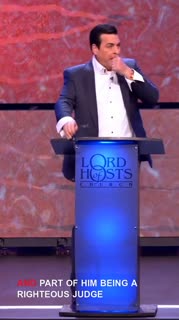Experiencing God's Goodness Through Faith and Mercy
Devotional
Sermon Summary
Bible Study Guide
Sermon Clips
2. "And something happened to me last Sunday. It was in the second service. Uh, I know most of you go to the, the first service, but how many of you, uh, you at least caught what happened in the second service? Was that not powerful? There was a powerful presence, uh, that came where I believe the Lord himself walked in here. You say, well, how do I know I was kneeling down here and I was praying and we were all praying together and God was in the place. And, uh, it was kind of a interesting moment because I felt for a second, like I was all alone." [00:03:17] (36 seconds)
3. "And when he did that, he said, it's my turn. And what he was saying to us as I interpret it is all of us have been at a point where he's taken us and this country as far as we can go. Doesn't mean we don't keep standing, praying, fasting, fighting, voting. It just means there comes a point when it comes to God that if you do certain things, it triggers him to respond. It triggers him to act. Look at Psalm 119, 126." [00:05:08] (43 seconds)
5. "You side with what God likes, and you stand against what he hates. Deuteronomy chapter 30. It's not deep. I said before you, God said it before a nation, life and death. Therefore, when you vote, you better choose life and the candidate that's going to go the way of life. And when you bless Israel, not as cockling Hamas. Now she's changing. We are always been pro -Israel. Oh, sure, the few days before the scheduled election you now are. But out of your own horse's mouth. You know. You know what you said." [00:12:20] (54 seconds)
7. "Finally, after a while, Luke 18. Finally, after a while, she, it dawns on her. She, it dawns on her. She keeps appealing to a higher court. She keeps appealing to a higher court. We have been doing that. We even had OTAs. This is why, can I tell you something? Please listen to this passage. Pastor, every time I hear that we owe a bill on that conference, I'm like, come on, God, that is not fair. I did that conference. I pleaded with you I didn't want to do it because I knew that all the bills were coming due. But if you remember Smoke on the Water night, you remember when Robert Henderson came and we appealed to God?" [00:17:05] (38 seconds)
8. "And part of him being a righteous judge is he first has to extend mercy. He has to give the opportunity for mercy to be extended, or he's not a righteous judge. Because mercy, right, is unmerited, undeserved favor. Let me give you an example. Well, you know what, let me, no, let me do this. Let me just, I'll talk about mercy in a minute more so. But I want to show you in scripture what I believe, and I didn't get this myself. This one scripture was from Perry Stone. Somebody had given me a word about his book called Plucked from the Eagle's Wings. Fascinating book about America." [00:20:04] (41 seconds)
9. "mercy comes in where I believe that God as he's looking at the scheduled election is going okay okay there's certain four things that that caused me to to move but here's one thing that I think is in the heart of God that when George Washington and his army was fighting for this great country that somehow this is in the heart of God and you find in the scripture it says and there were four great beasts that came up from the sea diverse from one another the first was like a lion come on what nation is like the lion United Kingdom and what happened it had eagle's wings but I looked and those wings were plucked come on we broke away from England and these wings were lifted up from the earth come on there's been no greater nation than United States of America and this nation these eagle's wings stood upon its feet as a man and a man's heart or compassion was given to it come on America's been one of the most compassionate nations somehow I believe that has touched God then he sees another beast a bear which is Russia that had a hunger for war so I believe that even in scripture God is showing that there are certain things of how he made this country to be and because we've prayed we fasted we stand with God we stand with what's right and there's certain covenants and things that God remembers I want to bring you to Moses now there was a moment I want you to go to Exodus 32 there was a moment where God was very very mad that's why the Bible says you can sit be angry but don't sin God doesn't sin with his anger when we get angry we sin now it doesn't mean that you can't have righteous anger God had righteous anger and he kept himself holy you can have righteous anger like I do up here behind this pulpit and stay holy right same with you just because you're upset about something you you have a righteous indignation there's nothing wrong with that don't ever believe the lies that you have to be so nice you can't say anything no that's what they want you to think judge not lest you be judged no that's not what the Bible says the Bible says that scripture but that's not what it means it means don't call out and point your finger at something when you're doing it or worse but you have a right to it to judge Jesus said in Matthew 7 you'll know them by their fruits and he talked about two types of trees a good tree and a bad tree and how do you know that you can judge it as a good tree or a bad tree look" [00:22:12] (156 seconds)
10. "And so we, your people, we let you do your part now. We give thanks. We trust you. And we thank you as there was victory and is victory. And the beautiful table of the Lord, there's victory in our lives, spirit, soul, and body. There's victory in our cities. The restraint of God is against every evildoer or uprising or chaos. And your victory, I pray and believe, is over this great country. We partake as a sign and an honor to you. We trust you. Let's partake." [00:45:44] (50 seconds)







